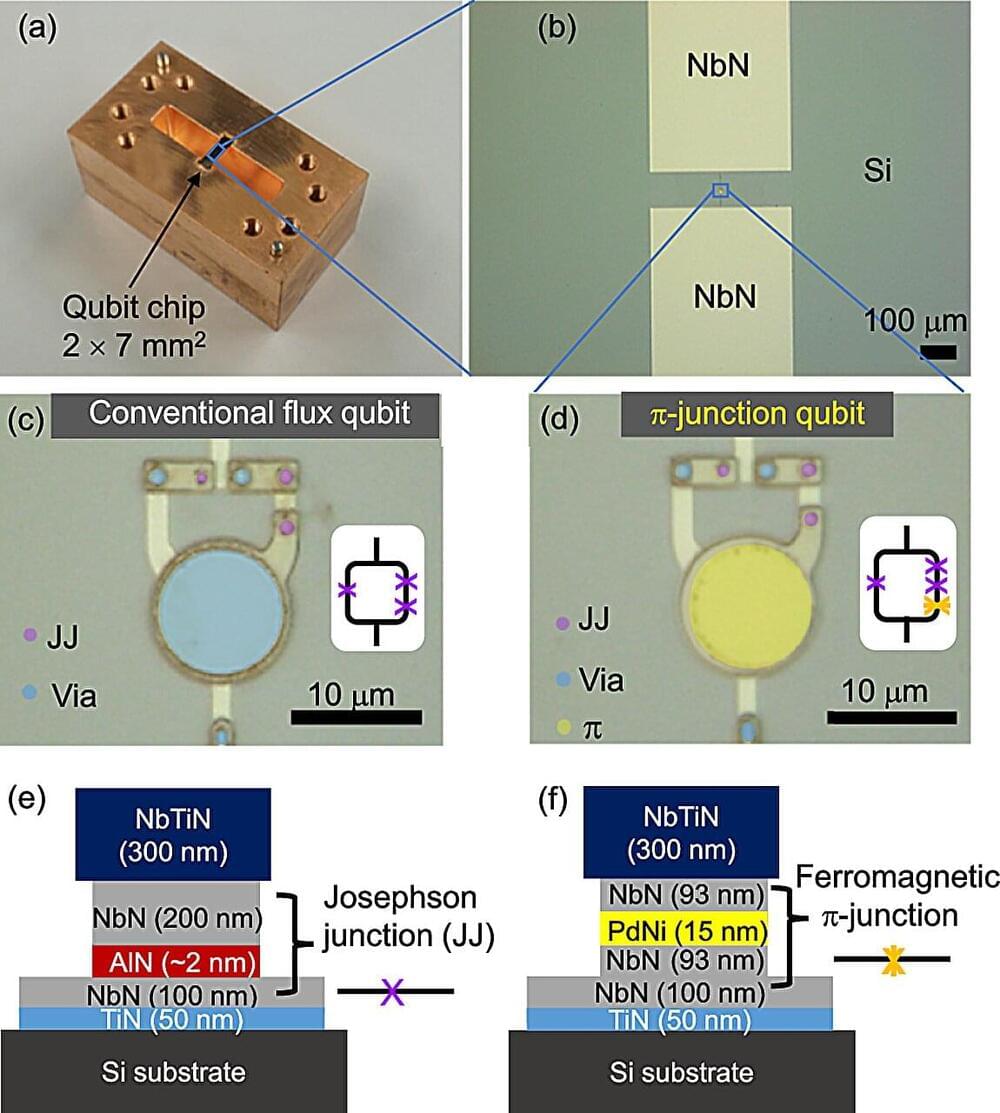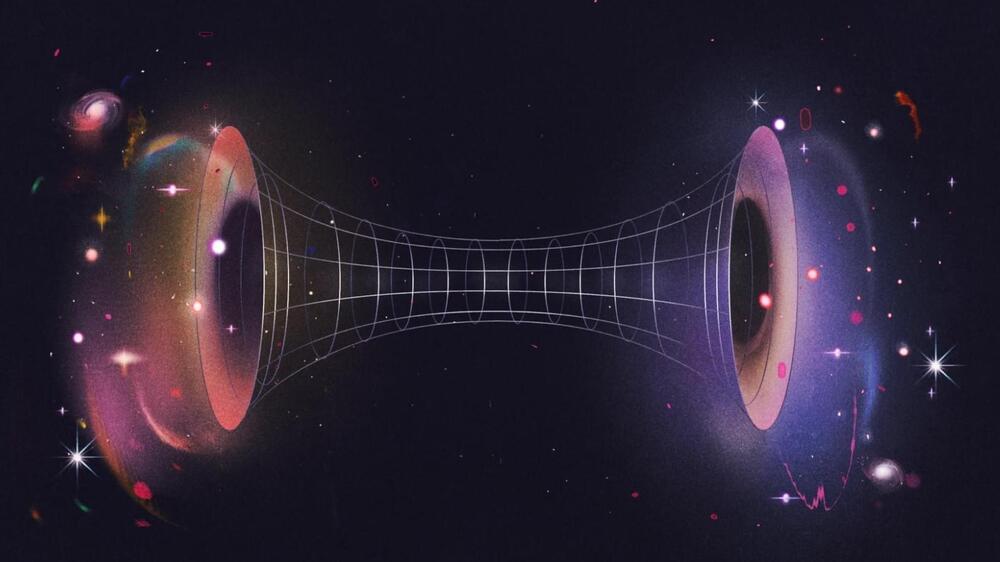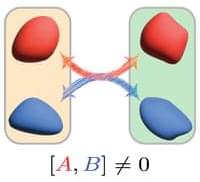A research team has successfully achieved an atomically controlled insulator-to-metal transition in iridate/manganate heterostructures. Their findings were recently published in Nature Communications.




First coherent picture of an atomic nucleus made of quarks and gluons.
For the first time, quarks and gluons were used to describe properties of atomic nuclei, which until now had been explained by the existence of protons and neutrons. The temporary pair of correlated nucleons is highlighted in purple. (Source: IFJ PAN)
The atomic nucleus is made up of protons and neutrons, particles that exist through the interaction of quarks bonded by gluons. It would seem, therefore, that it should not be difficult to reproduce all the properties of atomic nuclei hitherto observed in nuclear experiments using only quarks and gluons. However, it is only now that physicists, including those from the Institute of Nuclear Physics of the Polish Academy of Sciences in Cracow, have succeeded in doing this.
It’s almost a century since the discovery of the main components of atomic nuclei: protons and neutrons. Initially, the new particles were considered indivisible. In the 1960s, however, there was a suggestion that, at sufficiently high energies, protons and neutrons would reveal their internal structure – the presence of quarks constantly held together by gluons. Soon afterwards, the existence of quarks was confirmed experimentally. It may therefore seem surprising that, despite the passage of many decades, no one has been able to reproduce with quark-gluon models the results of nuclear experiments at low energies when only protons and neutrons are visible in atomic nuclei. This long-standing deadlock has only now been broken, in a paper published in Physical Review Letters. Its main authors are scientists from the international nCTEQ collaboration on quark-gluon distributions, including those from the Institute of Nuclear Physics of the Polish Academy of Sciences (IFJ PAN) in Cracow.

ORNL’s breakthrough boosts 3D-printed turbine blades, reducing carbon emissions.
Researchers have made significant efforts to enable additively manufactured turbine blades to better handle extreme temperatures. They have developed and 3D printed the lightest crack-free alloy capable of operating without melting at temperatures above 2,400 degrees Fahrenheit.
The milestone was achieved by researchers at Oak Ridge National Laboratory (ORNL) and the National Energy Technology Laboratory (NETL).
The alloy is expected to enable additively manufactured turbine blades to effectively handle extreme temperatures and reduce the carbon footprint of gas turbine engines such as those used in airplanes.
Enjoy the videos and music you love, upload original content, and share it all with friends, family, and the world on YouTube.

Our very own Milky Way could host a huge bridge in space-time. At least, that’s what the authors of a recent study have suggested. According to the group, teamwork between Indian, Italian, North American scientists and scientists from other countries at the International School for Advanced Studies (SISSA) in Italy.
The central disk of Milky Way may host the necessary dark matter to support the formation and nourishment of a “stable and controllable” tunnel to a distant section of space-time –known as a wormhole. The group’s study was issued in the November 2014 issue of Annals of Physics. A pre-print of this research paper is also available at arxiv.org.
Wormholes (also known as Einstein-Rosen Bridge) were first theorized by Albert Einstein and Nathan Rosen in 1935. Albert Einstein and Nathan Rosen suggested their idea as a way to get around the notion of black hole singularities.

Twesh Upadhyaya, William F. Braasch, Jr., Gabriel T. Landi, and Nicole Yunger Halpern PRX Quantum 5, 030355 – Published 23 September 2024 https://journals.aps.org/prxquantum/abstract/10.1103/PRXQuantum.5.
As an ice cube melts in water, the heat exchange d by the two produces disorder. Imagine measuring the heat flow while the ice melts in each of many trials. From the measurement results, one can compute the disorder generated in each trial—the stochastic entropy production (SEP). The SEP is well understood in the case of two classical systems interacting; there is one widely accepted SEP definition that can be expressed equivalently via three formulas. But the situation is far murkier for quantum analogues, such as two atoms exchanging components of spin.
Generalizing the three SEP formulas to accommodate quantum systems, we prove that quantum effects render the three SEP formulas inequivalent. Each formula reasonably quantifies entropy production and highlights a different aspect of the underlying physics. The inequivalence of the formulas stems from the inability to simultaneously measure the exchange d quantities of the quantum systems, i.e., the uncertainty principle. This quantumness leads to negative and even nonreal entropy production. Though unusual, these entropy values herald notable physical phenomena. A negative entropy production signals superposition in the thermal initial states of the quantum systems. An imaginary entropy production witnesses contextuality, a precise notion of nonclassicality.
Our work reveals new facets of entropy production for quantum systems, with potential implications for the performance of future technologies. For example, negative entropy production could be harnessed to improve the efficiency of a quantum engine.
Next Generation Biomanufacturing Technologies — Dr. Leonard Tender, Ph.D. — Biological Technologies Office, Defense Advanced Research Projects Agency — DARPA
Dr. Leonard Tender, Ph.D. is a Program Manager in the Biological Technologies Office at DARPA (https://www.darpa.mil/staff/dr-leonar…) where his research interests include developing new methods for user-defined control of biological processes, and climate and supply chain resilience.
Prior to coming to DARPA, Dr. Tender was a principal investigator and led the Laboratory for Molecular Interfaces in the Center for Bio/Molecular Science and Engineering at the U.S. Naval Research Laboratory. There, among other accomplishments, he facilitated numerous international collaborations with key external stakeholders in academia, industry, and government and his highly interdisciplinary research team, comprised of electrochemists, microbiologists, and engineers, is widely recognized for its many contributions to the field of microbial electrochemistry.
Dr. Tender earned a doctorate degree in analytical chemistry from the University of North Carolina, Chapel Hill; a bachelor’s degree in chemistry from the Massachusetts Institute of Technology; completed a post-doctoral fellowship in the Department of Chemistry from the University of California, Berkeley; and served as a visiting scientist in the Stanford University Department of Chemistry.
Dr. Tender co-founded the International Society for Microbial Electrochemistry and Technology and is a recipient of the Arthur S. Flemming Award, which honors outstanding federal employees, by the George Washington University’s Trachtenberg School of Public Policy and Public Administration.
To access the video, kindly visit.
Dive into the fascinating world of GlycoRNA in this insightful video! GlycoRNA, a newly emerging field at the intersection of glycobiology and RNA research, explores how glycan modifications on RNA molecules can influence gene expression and cellular function. Join us as we break down the basics of glycoRNA, its role in health and disease, and its potential applications in medicine and biotechnology.
References: https://zfangcs.wordpress.com/2021/06…
https://answers.childrenshospital.org…
Thank You For Watching.
Please Like And Subscribe to Our Channel: / easypeasylearning.
Like Our Facebook Page: / learningeasypeasy.
Join Our Facebook Group: / 460057834950033
Support Our Channel: / supereasypeasy.